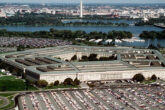October 19, 2021
Why the Pentagon Should Abandon ‘Strategic Competition’
Nearly every child is taught when making a request to “say the magic word”: please. The U.S. Defense Department has recently been taught it too needs to say the magic word in every force, capability, or resource request. But the magic word isn’t please; it’s the phrase “strategic competition.”
The National Defense Strategy (NDS) sets U.S. military priorities and is produced every four years to align with a new administration. As the Pentagon develops the next NDS, scheduled to be delivered in February 2022, it has an opportunity to right where the last strategy went wrong: the concept of strategic competition.
The Pentagon will need to make sure that one magic word or concept is not substituted for another.
The 2018 NDS ushered in an era in which long-term “inter-state strategic competition” with China and Russia reigned. Further complicating matters, Trump administration officials often interchangeably used the phrase great-power competition to describe this development. The concept became a priority mission without a clear definition of what it meant, the actions that comprised it, or what “winning” the competition looked like. Although this might seem innocuous, the establishment of this broad, undefined mission for the Defense Department has had deleterious effects and undermined the strategy’s original intent.
The Biden administration reportedly favors the strategic competition terminology but is differentiating their idea from the Trump-era concept. Although administration officials maintain that strategic competition conveys a focused and disciplined approach, it is likely to have the reverse effect as competition is not a means nor an end in itself. The Trump administration at least emphasized competition with great powers, which delineated the important threats and deprioritized threats like North Korea, Iran, and terrorism. The Biden administration, therefore, appears to be making the next NDS’s centerpiece a term that is even broader and fuzzier than its predecessor.
Read the full article from Foreign Policy.
More from CNAS
-
DEFAERO Strategy Series [Apr 09, 25] CNAS' Becca Wasser and Phil Sheers on Revitalizing the U.S. Defense Industrial Base
On this episode of the Defense & Aerospace Report Strategy Series, sponsored by General Atomics Aeronautical Systems, Becca Wasser and Phil Sheers of the Center for a New Amer...
By Becca Wasser & Philip Sheers
-
From Production Lines to Front Lines
Executive Summary The U.S. defense industrial base (DIB) is struggling to meet the demands of the current strategic environment—let alone prepare for a potential conflict agai...
By Becca Wasser & Philip Sheers
-
The Pentagon’s Endangered Brain Trust
In this environment, sound assessments of emerging threats and new ideas to counter them will be especially vital....
By Dr. Andrew Krepinevich, Jr.
-
Siliconsciousness: The AI Competition: Public Policy Strategies: Part 1
This episode comprises the first part of our special event, “The AI Competition: Public Policy Strategies”. The event, co-hosted by MIT Technology Review, brings together some...
By Dr. ED McGrady




